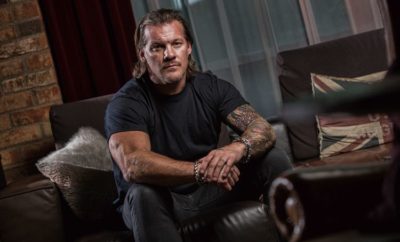Features
Dhani Jones & Evan Dollard – Spartan: Ultimate Team Challenge
By: Taylor Gates
The first thing Dhani Jones does is grab a pen and write down the names of all the press members he will be eating lunch with at the bottom of his menu. The second thing he does is debate whether he wants to order the salad or the more enticing cheeseburger. He eventually decides to splurge and get the burger, but not before making each of us promise to share his side of fries.
Teamwork has always been important to Jones, who played in the NFL for eleven years, which is one thing that drew him to hosting “Spartan: Ultimate Team Challenge.” Jones said, “Everything is about ‘me, me, me, me, me.’ Let’s throw in a little bit of ‘us’ to make up for it.”
Though Jones is no stranger to television, hosting programs like “Timeless” and appearing on his own reality series “Dhani Jones Tackles the Globe,” he assures us that this is the show he’s always wanted to be a part of because of its focus on collaboration.
Evan Dollard, a course reporter for the program, agrees. “I all but begged [producer] A. Smith to let me audition for this show; it was right up my alley. The whole team component just made me enthusiastic about it. It’s really a game-changer with the team aspect. It really tells the story and draws the audience into it.”
Dollard is no stranger to intense obstacle courses himself or NBC. Dollard appeared on five seasons of “American Ninja Warrior” before hosting a web series called “Well-Trained Warrior,” a show teaching people how to prepare to be a Ninja Warrior. That is when Smith found out about his interest in transitioning from athlete to host.
Both Dollard and Jones walk the walk and talk the talk as Jones has competed in three Spartan races himself while Dollard brags an impressive six. But never have they competed on a Spartan team, which they assure us comes with its own set of challenges. “There are fourteen other people around you and it’s not how strong you are individually, but how strong you are as a team. When you have that team dynamic, you need to be strong, you need to be fit and you need to work together and be able to continue for a whole mile,” Dollard says. That isn’t always an easy task. Communication can either be your biggest asset or your Achilles heel. “You hear the frustration, especially at the slip-wall,” he notes.
The slip wall is of course a wet, muddy, 25-foot wall team members must conquer by physically climbing on top of each other. Naturally, it’s last on the map, after all of the athletes are most fatigued. And that’s not the only difficult obstacle. “The shield carry,” Jones explains, “is when everyone has to hold onto a heavy shield and carry it between obstacles. People were calling each other out or they were lifting each other up or they were being quiet and passive aggressive. They set up the next blowup or buildup. People want to test the bond they think is unbreakable, and this show really tests those boundaries.” They assure us it’s not all about tension, though. “You’ll become a closer group than when you first went into it,” Jones promises.
One of the coolest parts of the show is seeing how the team dynamics shift over the course of the episode. “You see different leaders rise up throughout—ones you wouldn’t expect,” Dollard says. Jones elaborates on this point mentioning, “Phobias, like a fear of water, start to rear their heads sometimes throughout the race. People that you thought were rather weak you come to find out something else deep within them allows them to persevere through the end of the competition. Or you saw people that you thought were like, ‘man, nothing can stop them,’ run into a brick wall.”
Regardless of their finishing place, Dollard informs us that “every team, whether they win or lose, celebrates at the end. Even if they got third place. Even if they got eliminated. Because they did come together as a team and accomplish something that they previously thought was impossible, which is (in my mind) one of the most magical and special moments of this show.”
This show is full of poignant moments, especially since the audience gets to know the teams and learn their backstories before seeing them compete. “It’s much more than an athletic competition. It really is the story of these teams, and that’s intentional,” says Dollard. Echoing Dollard’s point, Jones says, “It’s really geared around the people, around the everyday person fighting for something that’s greater than him or herself. A young woman is running for her mother who passed away from breast cancer, a young man for his daughter, another team whose from all different places around the world—you see the stories and the backgrounds of the people. You see incredible stories unfold right before your eyes. Things that you thought would never happen.”
The only stipulation is that there must be two females and two males on each team. Every team has to send in a video saying how they knew each other, what their training regimen is like, what their story is and why they want to do this show in particular. This season contestants age range from twenty-one years old to a grandmother in her sixties who’s still “killing it and crushing people,” notes Jones. Other notable teams include Farmstrong (a team of farmers who trained for the spear throw by throwing pitchforks into hay bales), Spartan Singles (a group that met on an online site dedicated to single Spartan racers) and a man trying for the $250,000 prize so his father doesn’t have to work anymore.
“It’s always amazing to me, looking at the Spartan community, because anyone that signs up for one of those races is incredibly supportive,” Dollard says. “A. Smith has done a wonderful job of bringing the emotion and community and larger-picture aspect of a race and bringing it to life in the show.” The support is direly needed in such a challenging situation. Obstacles are based on actual, traditional Spartan races, but are super-sized. Everything is both squished together and heightened.
Dollard thinks the obstacles tend to sound a bit sadistic noting, “How do you even come up with that?” he laughs, recalling the log carry. “The imagination that went into this, to make it different enough from the Spartan racing and for teams was phenomenal. Like how do you make it both doable and challenging for both men and women?” Jones also jokes, “What he’s trying to say is there’s a warehouse with a mad scientist somewhere. Because you’re tall, that makes it hard to do other things and if you’re shorter that makes it easier to do other things. And if you have a team where some people are tall and some people are shorter…that makes the log carry more uneven and challenging. There’s different pieces to making one obstacle more challenging than the next.”
So who would these two pick to be on their own Spartan teams? “I’d probably lead with my dad and my brother,” says Dollard. “My brother is four years younger, but we’re basically genetic equals—same height, we’ve been competitive our whole lives. And it’s something I want to do with him, seeing the emotion at the finish line and the process of getting there. It’s not so much about building a team I know would win (although the $250,000 would be nice), I just want to surround myself with people to share an incredible experience with.”
“Of course I’d pick Evan,” Jones begins, causing Dollard to be skeptical. “I’d pick you, man! You’re my person,” he says reassuringly. He then settles on his manager and his girlfriend as well so he can see his manager out of his element and so he can see his girlfriend get mad and pick up the 650-pound telephone pole on her own. “Mom strength is a different kind of strength,” he says knowingly. As for celebrity teams? “Get one of those Hemsworth boys. Thor,” Jones says decisively. “Oh, and Spiderman would be great.” Dollard, without hesitation, picks Jason Bourne.
These two have no doubt this show is going to be a huge success, citing both the smash hit “American Ninja Warrior” for paving the way as well as an American health industry revolution. “It all comes down to timing and the fitness industry is changing,” says Jones. “There was a movement in America for people to get in shape with their next of kin or friend.
“American Ninja Warrior” gyms are popping up everywhere and Jones hopes the same happens with Spartan racing after this program. “I would love every single cul-de-sac and every single suburban neighborhood to become Sparta and every single backyard to become Sparta and that person working at the gas station to say, ‘Hey, why don’t we go to Spartan?’”
When asked if they had any advice for Spartans-in-training, they had some good words of wisdom to offer. “You need a level of cardiovascular fitness and you need to be adaptable. That’s a critical component,” says Dollard. “Find your people. Find your purpose. Find your sense of pride,” says Jones. “And just go out there and go for it. You don’t know what your true capacity is until you do it. You never know until you try and go for it.”




You must be logged in to post a comment Login